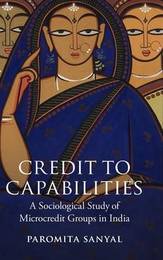
|
Credit to Capabilities: A Sociological Study of Microcredit Groups in India
Hardback
Main Details
| Title |
Credit to Capabilities: A Sociological Study of Microcredit Groups in India
|
| Authors and Contributors |
By (author) Paromita Sanyal
|
| Physical Properties |
| Format:Hardback | | Pages:336 | | Dimensions(mm): Height 231,Width 150 |
|
| Category/Genre | Credit and credit institutions |
|---|
| ISBN/Barcode |
9781107077676
|
| Classifications | Dewey:332 |
|---|
| Audience | | Professional & Vocational | | Tertiary Education (US: College) | |
|---|
| Illustrations |
15 Tables, unspecified; 1 Maps; 15 Line drawings, black and white
|
|
Publishing Details |
| Publisher |
Cambridge University Press
|
| Imprint |
Cambridge University Press
|
| Publication Date |
11 December 2014 |
| Publication Country |
United Kingdom
|
Description
Credit to Capabilities focuses on the controversial topic of microcredit's impact on women's empowerment and, especially, on the neglected question of how microcredit transforms women's agency. Based on interviews with hundreds of economically and socially vulnerable women from peasant households, this book highlights the role of the associational mechanism - forming women into groups that are embedded in a vast network and providing the opportunity for face-to-face participation in group meetings - in improving women's capabilities. This book reveals the role of microcredit groups in fostering women's social capital, particularly their capacity of organizing collective action for public goods and for protecting women's welfare. It argues that, in the Indian context, microcredit groups are becoming increasingly important in rural civil societies. Throughout, the book maintains an analytical distinction between married women in male-headed households and women in female-headed households in discussing the potentials and the limitations of microcredit's social and economic impacts.
Author Biography
Paromita Sanyal is an Assistant Professor of Sociology at Cornell University, New York. Her research interests include development, gender, economic sociology, and participatory forms of governance like deliberative democracy (gram sabha in India). She has been previously affiliated with Harvard University, Massachusetts and the Development Research Group at the World Bank.
Reviews'Microcredit has been a major interest of development economists for years, given their effectiveness as an engine of upward mobility among the poor. Paromita Sanyal's remarkable book gives us a different lens on their importance. She reveals the critical role of microcredit in enabling women to build independent lives even in the face of traditional suppression. This engaging study should be read by students, scholars and policy makers who want to know how this strategy can make a profound difference for women in developing countries.' Katherine Newman, Provost, University of Massachusetts, Amherst, and author of Taxing the Poor: Doing Damage to the Truly Disadvantaged 'The remarkable global phenomenon of microcredits has finally found its wise analyst. Drawing from hundreds of vivid interviews with Indian women, Paromita Sanyal offers bold explanations of when, how, and in what ways microcredits enhance female autonomy. Credit to Capabilities contributes fresh insights to the study of economic activity and household gender dynamics.' Viviana A. Zelizer, Lloyd Cotsen '50 Professor of Sociology, Princeton University, and author of The Purchase of Intimacy and Economic Lives 'Credit to Capabilities is a major contribution to our understanding of the social impact of microcredit on the ability of women to gain autonomy in various spheres of their lives. This qualitative study adds considerable nuances to existing analyses on the topic by parsing out who benefits, when, how much, and how. Sanyal's book is of broad sociological significance as a model for approaching agency and social change. A must-read for students of gender, development, economic sociology, family, deliberation, and much more.' Michele Lamont, Director, Weatherhead Center for International Affairs, Harvard University
|